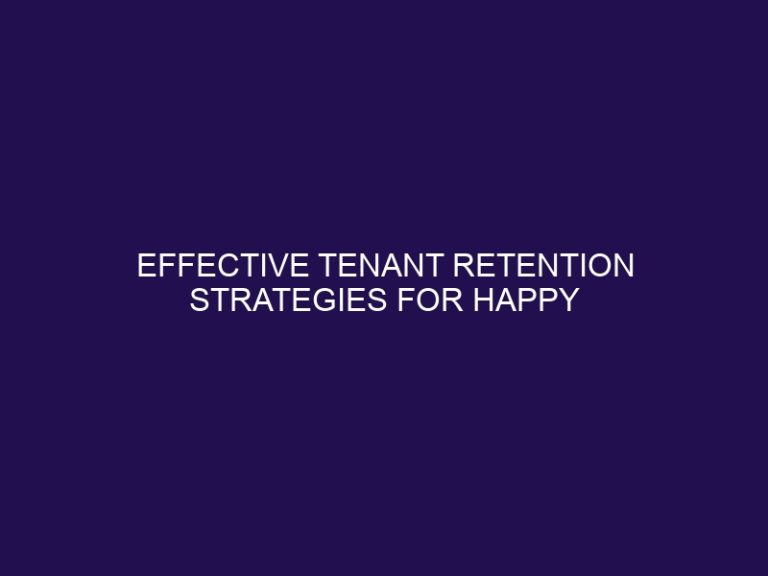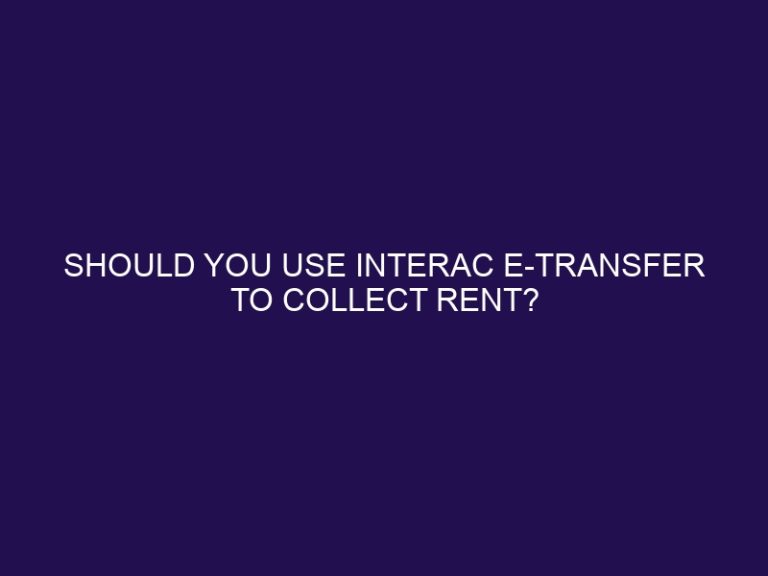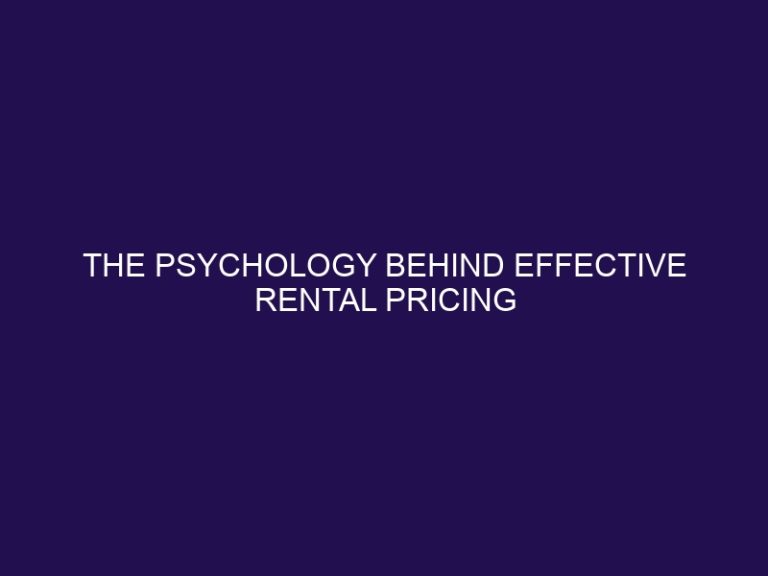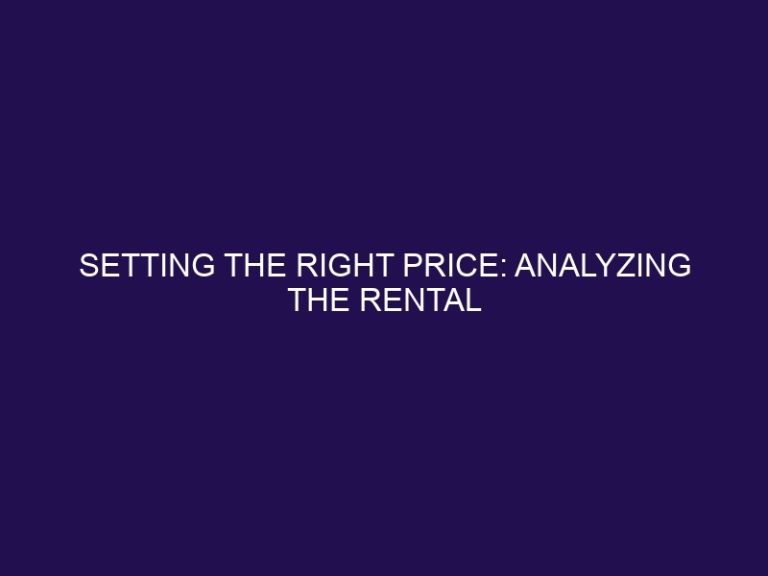5 Ways to Build Your Brand Online as a Property Manager
“The Importance of Building Your Brand Online as a Property Manager”
In today’s digital age, establishing a strong online presence is essential for property managers to attract and retain clients. Building your brand online not only helps increase your visibility, but it also enables you to showcase your expertise, connect with your audience, and stand out from competitors. Here are five key strategies to effectively build your brand online as a property manager.
1. Develop a Professional Website:
Creating a professional website is crucial for establishing credibility and providing potential clients with essential information about your property management services. Choose a memorable domain name that reflects your brand and create a user-friendly interface for easy navigation. Showcase your expertise and services through informative content and visually appealing visuals.
2. Utilize Social Media Platforms:
Social media platforms offer a powerful way to reach and engage with your target audience. Identify the right social media channels where your potential clients are most active, such as Facebook, Instagram, or LinkedIn. Create engaging and relevant content that educates, entertains, and adds value to your followers. Interact and engage with your audience by responding to comments, messages, and inquiries promptly.
3. Implement Search Engine Optimization (SEO) Strategies:
Optimizing your website for search engines is crucial for improving your online visibility. Research and use relevant keywords related to property management in your website content and meta tags. Optimize your website and content by optimizing loading speed, incorporating internal and external links, and utilizing header tags. Build high-quality backlinks from reputable sources to boost your website’s authority and credibility.
4. Leverage Online Reviews and Testimonials:
Online reviews and testimonials play a pivotal role in establishing trust and credibility. Encourage satisfied clients to leave reviews on platforms like Google My Business, Yelp, or industry-specific review websites. Respond to reviews and feedback promptly and professionally. Showcase positive testimonials on your website to highlight the positive experiences of your clients.
5. Collaborate with Influencers and Industry Experts:
Partnering with influencers and industry experts can significantly expand your reach and enhance your reputation as a property manager. Identify relevant influencers in the property management industry who have a strong online presence. Establish partnerships and collaborations to co-create content or provide testimonials. Leverage the influencers’ reach and expertise to amplify your brand’s visibility and credibility.
By implementing these strategies, you can effectively build your brand online as a property manager, attract more clients, and establish yourself as a trusted and reputable professional in the industry.
The Importance of Building Your Brand Online as a Property Manager
Building your brand online as a Property Manager is crucial for establishing credibility, attracting potential clients, and staying competitive in the digital age. By showcasing your expertise and professionalism through compelling content and a user-friendly website, you can position yourself as a trusted authority in the industry. Online branding also allows you to engage with your target audience, build relationships, and receive valuable feedback.
The Importance of Building Your Brand Online as a Property Manager cannot be underestimated in today’s technology-driven world. Maintaining a strong online presence helps to differentiate yourself from competitors and increases your chances of being considered by potential clients.
Develop a Professional Website
Developing a strong online brand presence as a property manager begins with one crucial step: constructing a professional website. In this section, we will uncover the key strategies to build an engaging online platform that showcases your expertise and services. From selecting a memorable domain name to designing a user-friendly interface, we’ll explore how each element contributes to establishing your brand’s authority and attracting potential clients in the digital landscape.
Choose a Memorable Domain Name
- When selecting a domain name for your property management brand, be sure to choose one that is memorable.
- Consider the following steps when choosing a memorable domain name for your property management brand:
- Ensure the domain name reflects your property management business and services.
- Opt for a catchy and easy-to-remember domain name that stands out from competitors.
- Keep the domain name concise and free from complicated spellings or special characters.
- Include relevant keywords that potential clients might search for when looking for property management services.
- Align the domain name with your overall brand identity to maintain a cohesive image.
Create a User-Friendly Interface
Creating a user-friendly interface is essential for attracting and retaining clients on your property management website. Here are some steps to follow:
- Choose a clean and intuitive design that is easy to navigate.
- Ensure that your website is mobile-friendly for users on smartphones and tablets.
- Organize your content into clear categories and menus for easy accessibility.
- Incorporate features like search bars and filters to help users find relevant information quickly.
- Use clear and concise language in your website copy to convey information effectively.
- Include visually appealing elements, such as high-quality images and videos, to enhance the user experience.
- Regularly test and optimize your website to identify and fix any usability issues.
Remember, a user-friendly interface can greatly improve user satisfaction and increase conversions for your property management business.
In 2004, Facebook revolutionized social networking with its user-friendly interface, enabling easy connections and communication among friends and family. The simplicity and intuitive design of Facebook’s platform made it accessible to a wide range of users, propelling it to become one of the most popular social media networks globally.
Showcase Your Expertise and Services
To effectively demonstrate your expertise and services as a property manager, consider implementing the following strategies:
- Create an extensive portfolio: Showcasing your previous projects, managed properties, and successful outcomes will highlight your capabilities.
- Highlight client testimonials: Incorporate positive feedback from satisfied clients to establish trust and credibility.
- Provide informative content: Share valuable insights, tips, and industry knowledge through blog posts, videos, or infographics.
- Offer personalized consultations: By providing free consultations to potential clients, you can showcase your expertise and capabilities.
- Participate in industry events: Attend conferences, workshops, or networking events to display your knowledge and connect with potential clients.
Here’s a true story demonstrating the effectiveness of these strategies. A property manager named Sarah implemented these tactics and experienced a significant boost in her business. By developing a well-curated portfolio, sharing informative content, and leveraging client testimonials, she established herself as a trusted expert in her field. This led to an increase in client inquiries, ultimately resulting in profitable partnerships and a thriving property management business.
Utilize Social Media Platforms
With the ever-growing importance of online presence for property managers, utilizing social media platforms has become indispensable. In this section, we will uncover the secrets to effectively harnessing the power of social media. Discover how to identify the right channels, create engaging content, and truly connect with your audience. Get ready to take your brand to new heights in the digital realm!
Identify the Right Social Media Channels
To effectively build your brand online as a property manager, it is essential to identify the right social media channels. Here are some steps to assist you in this process:
- Understand your target audience: Determine who your potential clients are and on which social media platforms they are most active, helping you identify the right social media channels to focus on.
- Research social media demographics: Look into the demographics and user base of different platforms to determine if they align with your target audience, ensuring you choose the appropriate social media channels.
- Analyze competitors: Explore the social media presence of other property managers in your area to understand which platforms they are using and whether they are successful. This analysis will guide you in identifying the right social media channels.
- Consider the nature of your business: Evaluate the type of content you want to share and whether it aligns better with visual platforms like Instagram or more professional platforms like LinkedIn, enabling you to choose the most suitable social media channels.
- Test and monitor: Initially, create accounts on multiple platforms and monitor their performance. Analyze engagement rates, follower growth, and the overall effectiveness of your content, which will help you identify the social media channels that work best for your brand.
By following these steps, you can identify the social media channels that will best help you reach and engage with your target audience, ultimately enhancing your online brand as a property manager.
Create Engaging and Relevant Content
- Create Engaging and Relevant Content by understanding your target audience and tailoring your content to their needs and interests.
- Provide valuable and informative content, such as blog articles, videos, or infographics, that focus on property management tips, trends, and best practices.
- Incorporate visual elements like images and videos to make your content more engaging and captivating.
- Utilize storytelling techniques to connect with your audience and make your content more relatable.
- Encourage interaction and engagement with your audience by asking questions and inviting comments or feedback.
A property manager consistently followed these strategies, creating engaging and relevant content about property maintenance. As a result, they successfully attracted a loyal online following, leading to increased brand recognition, trust, and ultimately, more client referrals.
Interact and Engage with Your Audience
Interacting and engaging with your audience is crucial for building your brand online as a property manager. To ensure effective strategies to connect with your audience, here are some key steps you can take:
- Interact and engage promptly: When your audience reaches out via social media, email, or website inquiries, make sure to respond promptly and provide helpful information. This will demonstrate your dedication to customer service and create a positive impression.
- Create engaging content: Developing high-quality content that is informative, entertaining, and relevant to your audience’s interests and needs is essential for building engagement. By addressing their key concerns and interests, you can establish a strong connection.
- Encourage conversation: Actively involve your audience by asking questions, starting discussions, and encouraging them to share their thoughts and experiences. This will foster a sense of community and make them feel valued.
- Host online events: Take advantage of technology to organize webinars, live Q&A sessions, or virtual property tours. These events will not only attract your audience but also help you establish a personal connection and provide real-time interaction.
- Listen and take feedback seriously: Pay close attention to comments, reviews, and feedback from your audience. Show that you value their input by addressing concerns and making improvements based on their valuable feedback.
Implement Search Engine Optimization Strategies
Looking to boost your brand’s online presence as a property manager? Look no further than the power of search engine optimization (SEO) strategies. In this section, we’ll dive into the key techniques that can propel your website to the top of search engine results. From harnessing the potential of relevant keywords to optimizing your website and content, and building high-quality backlinks, we’ll equip you with the essential tools to increase your online visibility and attract potential clients. Let’s kick-start your journey to digital success!
Research and Use Relevant Keywords
To enhance your online brand as a property manager, it is essential to conduct thorough research and effectively incorporate relevant keywords. By doing so, you can increase the visibility of your website and attract your desired audience. Below are some strategies for incorporating relevant keywords:
Optimize Your Website and Content
To optimize your website and content as a property manager, there are several steps you can follow. First and foremost, it is essential to research and use relevant keywords. By incorporating these keywords, you can ensure that your website ranks higher in search engine results.
Additionally, optimizing the structure and content of your website is crucial. This can be achieved by using meta tags, header tags, and descriptive URLs. These elements not only enhance the user experience but also improve search engine optimization.
Creating high-quality and informative content that resonates with your target audience is another key aspect. Remember to incorporate the identified keywords strategically within the content. This will help improve the visibility of your website and make it more relevant to users.
In today’s mobile-centric world, it is essential to have a website that is mobile-friendly and has a responsive design. This ensures a seamless user experience across different devices and improves engagement.
Engaging visuals, such as images and videos, can significantly enhance the overall user experience. They capture the attention of visitors and improve engagement on your website.
Furthermore, implementing internal and external linking strategies can boost your website’s SEO and drive traffic to other relevant pages. This helps in improving the visibility and accessibility of your content.
Finally, it is crucial to optimize your website’s speed as it plays a significant role in user engagement and conversion rates. Studies show that websites that load within 2 seconds have an average bounce rate of 9%, while those that take 5 seconds to load have a bounce rate of 38%.
By following these steps and incorporating keywords effectively, you can optimize your website and content as a property manager.
Build High-Quality Backlinks
Building high-quality backlinks is crucial for boosting your online presence as a property manager. Here are some effective strategies to build strong backlinks:
- Guest blogging: Contribute valuable content to reputable property management blogs and include a relevant backlink to your website.
- Influencer collaborations: Partner with influencers in the real estate industry and have them mention or link to your website in their content.
- Online directories: Submit your property management business to trusted online directories, like Yelp or BBB, to gain authoritative backlinks.
- Content promotion: Share your informative and engaging content on social media platforms, encouraging others to share and link to it.
- Networking: Build relationships with other property managers and industry professionals, exchanging links and referrals.
Mary, a property manager, implemented these strategies and saw a significant increase in website traffic and inquiries. By utilizing these techniques to build high-quality backlinks, she cultivated a strong online presence and witnessed improved search engine rankings and more clients.
Leverage Online Reviews and Testimonials
Looking to boost your brand as a property manager online? Look no further than leveraging the power of online reviews and testimonials. In this section, we’ll dive into three sub-sections that will guide you on how to make the most of this valuable resource. From encouraging satisfied clients to leave reviews to effectively responding to feedback, and showcasing positive testimonials on your website, we’ve got all the strategies you need to establish a strong online presence and attract potential clients.
Encourage Satisfied Clients to Leave Reviews
Encouraging satisfied clients to leave reviews is crucial for building your brand online as a property manager. Here are some effective strategies to implement:
- Make it easy: Provide links to review sites and platforms where clients can leave feedback.
- Incentivize: Offer rewards or discounts to clients who leave reviews.
- Remind: Send follow-up emails or messages requesting reviews after positive interactions or successful transactions.
- Show appreciation: Respond to reviews with gratitude and acknowledge the client’s feedback.
- Showcase: Display positive reviews on your website or social media platforms to build trust and credibility.
Respond to Reviews and Feedback
Responding to reviews and feedback is crucial for building your brand online as a property manager.
By responding to reviews and feedback, you demonstrate professionalism, build trust with clients, and enhance your brand’s online presence.
Showcase Positive Testimonials on Your Website
- Showcase positive testimonials on your website by collecting them from satisfied clients and tenants.
- Choose a variety of testimonials that highlight different aspects of your property management services to effectively demonstrate your expertise.
- Create a dedicated testimonial page on your website that is easy to navigate for visitors.
- Ensure each testimonial includes the name, photo, and relevant details of the testimonial provider to add authenticity.
- Add a brief summary or tagline with each testimonial for quick reference, enhancing their impact.
- Regularly rotate and update the testimonials on your website to keep it fresh and engaging for users.
Collaborate with Influencers and Industry Experts
Collaborating with influencers and industry experts can be a game-changer when building your brand online as a property manager. Join me as we dive into the power of these collaborations and how they can drive your brand’s success. We’ll explore how to identify and connect with relevant influencers in the property management industry, the art of establishing fruitful partnerships, and the secrets of leveraging their reach and expertise. Get ready to supercharge your brand presence with the help of influential connections.
Identify Relevant Influencers in the Property Management Industry
- Conduct thorough research to identify relevant influencers in the property management industry. Look for individuals or organizations with a large following, strong engagement, and expertise in the field.
- Attend property management conferences, seminars, and networking events to connect with influencers in person. This will help you identify and establish relationships with the relevant influencers you have identified.
- Join property management forums, social media groups, and online communities where industry experts and influencers actively participate. This will provide you with the opportunity to engage with and learn from these influencers.
- Stay updated with industry blogs, newsletters, and publications to discover influencers who are regularly featured or quoted. This will help you stay informed about the important players in the property management industry.
- Engage with influencers by commenting on their posts, sharing their content, and initiating conversations. Building relationships with these influencers will help enhance your brand presence and establish yourself as a trusted authority in the property management industry.
Establish Partnerships and Collaborations
Establishing partnerships and collaborations is essential for developing your brand online as a property manager. To achieve this, it is vital to identify relevant influencers and industry experts in the property management field. Once you have identified them, you can establish partnerships and collaborations with them to benefit from their expertise and expand your reach. This can be accomplished through joint promotions, guest blogging, or co-creating content. By joining forces with influencers and industry experts, you can enhance your brand visibility, credibility, and connect with a wider audience. Strengthening partnerships and collaborations is the key to establishing yourself as a reputable property manager in the online arena.
Leverage Influencers’ Reach and Expertise
To maximize the impact and knowledge of influencers as a property manager, keep the following strategies in mind:
- Discover applicable influencers in the property management sector, such as well-known real estate bloggers or social media personalities.
- Create partnerships and collaborations with influencers by offering valuable content or exclusive access to your services.
- Make use of influencers’ reach by having them endorse your brand and services on their platforms, thereby reaching a broader audience.
- Tap into influencers’ expertise by featuring them in your content or organizing joint webinars or events to showcase their knowledge and provide added value to your audience.
- Engage with influencers and their followers by responding to comments and messages, fostering relationships that may lead to future collaborations.
For instance, a property manager in New York teamed up with a popular real estate influencer to produce a series of Instagram Live sessions. These sessions focused on discussing tips and insights for first-time homebuyers. This collaboration not only expanded the property manager’s reach but also positioned them as a trusted expert in the industry.
Frequently Asked Questions
1. How can social media help property managers build their brand online?
Social media is a valuable tool for property managers to establish their brand and gain visibility in a crowded marketplace. It allows property managers to reach their target audience, improve search engine results, and attract potential tenants and clients. By choosing the right social media platforms, creating engaging content, and being responsive to comments and messages, property managers can enhance their reputation and build trust with their audience.
2. What are some effective ways to use Facebook for property management branding?
Facebook offers various features that property managers can utilize to boost their branding efforts. Sharing eye-catching images, videos, articles, and special offers can attract visitors and drive traffic to their websites. Utilizing Facebook Live, property managers can give property tours and provide valuable insights into the property management industry. Sharing links to third-party authorities and providing unique content can also help boost authority and convert leads.
3. How can property managers leverage LinkedIn to build their brand?
LinkedIn is a crucial platform for property managers to establish authority, build business connections, and gain the trust of clients and the property management community. It is essential to have an accurate and professional profile on LinkedIn. Property managers can share relevant articles, videos, and other interesting information to showcase their expertise and establish themselves as thought leaders in the real estate industry.
4. What role does Instagram play in building a property management brand?
Instagram is an ideal platform for property managers to showcase highly visual content, such as photos of available properties, with links back to their websites. It is effective in attracting followers and clients through engaging visual assets. By planning and scheduling posts using tools like Hootsuite or Later, property managers can maintain a consistent posting schedule and attract higher-income residents who are active on the platform.
5. How important is personal branding for property managers?
Personal branding is crucial for property managers to stand out in a crowded marketplace. It involves creating a reputation for yourself rather than just promoting a product. By defining your target audience, establishing a clear direction for your personal branding strategy, and positioning yourself as an expert or thought leader in the real estate industry, property managers can build a strong personal brand and gain recognition among property owners and potential clients.
6. How can property managers ensure consistency in their branding efforts?
Consistency in branding is key for property managers. They should use the same branding across their website, social media platforms, brochures, signs, and business cards. Hiring a designer can help create a professional brand identity. Additionally, every interaction with the outside world, including social media posts and customer service, should reflect the brand’s values and commitment to excellence.







